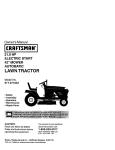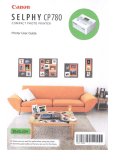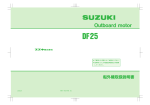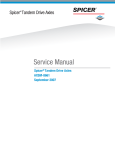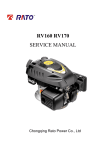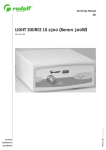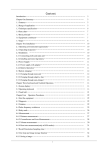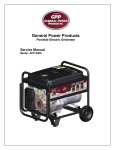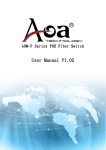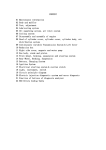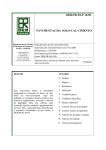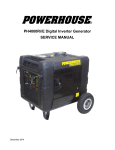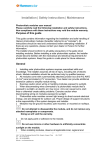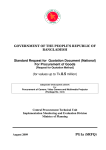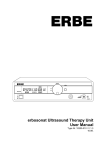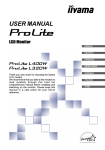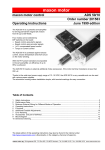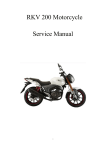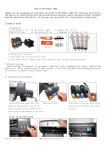Download gasoline engine r80-r440 horizontal shaft service manual
Transcript
GASOLINE ENGINE R80-R440 HORIZONTAL SHAFT SERVICE MANUAL CHONGQING RATO POWER MANUFACTURING CORPORATION This manual contains information about how to perform routine maintenance and how to do troubleshooting. Keep this manual handy, so you can refer to it at any time. This service manual describes correct methods for maintaining this equipment. If any personal casualty or equipment damage is caused due to disregard of our rules, our company does not assume any responsibility. NOTICE: Copyright is reserved, and no part of this publication may be reproduced without RATO Company’s written permission. SAFETY MESSAGES Your safety and the safety of others are very important. We have provided important safety messages in this manual and on the generator. Please read these messages carefully. A safety message alerts you to potential hazards that could injure you or others. Each safety and one of three words: DANGER, message is preceded by a safety alert symbol WARNING, or CAUTION. These messages mean: You WILL be KILLED or SERIOUSLY INJURED if you don’t follow instructions. You CAN be KILLED or SERIOUSLY INJURED if you don’t follow instructions. You CAN be INJURED if you don’t follow instructions. Your generator or other property could be damaged if you don’t follow instructions. CONTENTS 1. INTRODUCTION ·············································································································· 1 1-1 PARTS DESCRIPTION····························································································· 1 1-2 SPECIFICATION ······································································································ 2 1-3 SERVICE LIMIT ······································································································· 3 2. DIMENSIONS AND TORQUE ·························································································· 6 2-1 ENGINE DIMENSIONS ··························································································· 6 2-1-1 R100 ······················································································································· 6 2-1-2 R80/R160/R180/R200/R210/R225 ·································································· 7 2-1-3 R270/R280/R300 ····························································································· 8 2-1-4 R390/R420/R440 ····························································································· 9 2-2 TORQUE VALUES ································································································· 10 2-3 STANDARD Torque valueS ···················································································· 12 3. MAINTENANCE ············································································································· 13 3-1. Maintenance schedule ····························································································· 13 3-2 engine oil ················································································································· 14 3-3 Air cleaner ··············································································································· 15 3-4 Cleaning of the fuel filter ························································································· 15 3-5 spark plug cleaning and adjusting ············································································ 16 3-6 valve clearance adjustment ······················································································ 16 3-7 governor··················································································································· 17 4. DISASSEMBLING AND SERVICING ··········································································· 18 4-1 Troubleshooting ······································································································· 18 4-1-1 Hard starting ·································································································· 18 4-1-2 Engine lacks power························································································ 20 4-1-3 Speed is unstable ··························································································· 21 4-1-4 Motor is unable to start ·················································································· 21 4-1-5 Exhaust gas color is abnormal ······································································· 22 4-1-6 Unable to ignite ····························································································· 22 4-1-7 Oil alert system malfunction ·········································································· 23 4-1-8 GASOLINE ENGINE IS OVERERHEATED ··············································· 23 4-2 Preparation of servicing ··························································································· 24 4-2-1 Safety precautions ························································································· 24 4-2-2 Special tools ·································································································· 28 4-3 DISASSEMBLING chart ························································································ 29 4-4 Engine······················································································································ 30 4-4-1 Recoil starter·································································································· 31 4-4-2 Flywheel ········································································································ 33 4-4-3 Air cleaner ····································································································· 35 4-4-4 Carburetor······································································································ 37 4-4-5 Cylinder head /valve ······················································································ 40 4-4-6 Crankshaft/piston ··························································································· 46 4-4-7 Starting control box ······················································································· 55 1. INTRODUCTION 1-1 PARTS DESCRIPTION Fuel tank cover Air cleaner Fuel tank Muffler Throttle grip Spark plug Recoil starter Choke lever Start handle Drain plug Oil dipstick 1 1-2 SPECIFICATION Model R210 R225 L×W×H 390×320×345mm 390×320×345mm Dry Weight 16.5 kg 16.5kg items Engine Type Displacement 4-stroke, OHV, single cylinder 212 cm3 223cm3 Compression Ratio 8.5±0.3 Bore×Stroke 70×55 mm 70×58mm Maximum Output Power 4.2/3600 rpm 4.4kW/3,600rpm Maximum Torque 12N·m/2500rpm 13N·m/2,500rpm Cooling System Forced Air-cooled Ignition System Transistorized Magneto Ignition(TCI) Spark Plug BPR6ES(NGK),NHSP LD F7RTC,F7TC Lubrication System Forced Splash PTO Shaft Rotation Counterclockwise Model items R420 L×W×H 465×415×440mm Dry Weight 28kg Engine Type 4-stroke, OHV, single cylinder Displacement 420cm3 Compression Ratio 8.5:1 Bore×Stroke 90×66mm Maximum Output Power 8.5kW/3,600rpm Maximum Torque 25N·m /2,500rpm Cooling System Forced Air-cooled Ignition System Transistorized Magneto Ignition(TCI) Spark Plug BPR6ES(NGK),NHSP LD F7RTC,F7TC Lubrication System Forced Splash PTO Shaft Rotation Counterclockwise 2 1-3 SERVICE LIMIT 1-3-1 R210 Parts Item Standard Value Gasoline Engine Maximum Speed (No Load) Cylinder Cylinder Bore I.D. Cylinder Head Warpage 3750-3810rpm ≧1.17Mpa(1400rpm) Cylinder Compression 70.165mm -- 0.10mm 69.965-69.985 mm 69.845mm 0.015-0.050mm 0.12mm 18 .002-18.008 mm 18.048mm Piston Pin O.D. 18.0-17.994 mm 17.954mm Piston Pin-to-Piston Pin Bore Clearance 0.002-0.014mm 0.06mm Ring Side Clearance: 0.035-0.070mm 0.15mm -- -- 0.2-0.35mm 1.0mm Oil Ring 0.2-0.7mm 1.0mm Top /Second/Oil Ring 1.5-1.450 mm 1.37mm 2.5-2.450 mm 2.37mm 18.005-18.020mm 18.07mm 30.020-30.033mm 30.066mm 0.040-0.063mm 0.12mm 0.1-0.7mm 1.1mm 29.970-29.980mm 29.920mm IN 0.15±0.02mm -- EX 0.20±0.02mm -- IN 5.468 -5.48mm 5.318mm EX 5.425 -5.44mm 5.275mm IN/EX 5.50-5.512 mm 5.572mm IN 0.02-0.044mm 0.1mm EX 0.06-0.087mm 0.12mm 0.7-0.9 mm 2.0mm 30.0 mm 28.5mm 27.500-27.900mm 27.450mm Piston-to-Cylinder Clearance Piston Pin Bore I.D. Top /Second Ring Oil Ring Piston Rings Ring End Gap: Ring Width: Top /Second Ring Small End I.D. Connecting Big End I.D. Rod Big End Oil Clearance Big End Side Clearance Crankshaft Crankshaft pin O.D Valve Clearance Stem O.D Valve Guide I.D Stem-to-Guide Clearance Seat Width Spring Free Length Camshaft -- 70.0-70.015 mm Skirt O.D. Piston Service Limit Cam Height IN 3 EX 27.547-7.947mm 27.500mm 13.966 -13.984mm 13.916mm 14-14.018mm 14.048mm 0.85 -- 13.7±1.5mm -- 2-1/8 circle -- Spark Plug Gap 0.7-0.8mm -- Spark Plug Resistance Cap 7.5-12.5kΩ -- Primary Coil 0.8-1.0Ω -- Secondary Coil 5.9-7.1kΩ -- 0.4-0.6mm -- Standard Service limit Journal O.D Crankcase Cover Camshaft Holder I.D. Main Jet Carburetor Float Height Pilot Screw Opening Resistance Ignition Coil Air gap 1-3-2 R420 Parts Engine Item Maximum speed (No load) 3750-3850rpm Cylinder compression ≧1.2Mpa(1400rpm) Cylinder Sleeve I.D head 90-90.015mm 90.17mm -- 0.10mm Skirt O.D. 89.96-89.97 mm 89.85mm Piston-to-cylinder clearance 0.03-0.055 mm 0.27mm Piston pin bore I.D. 20.002-20.008 mm 20.042mm Piston pin O.D 19.992-19.998 mm 19.950mm 0.004-0.016 mm 0.08mm 0.02-0.06mm 0.15mm -- -- 0.2-0.4 mm 1.0mm Oil 0.2-0.7 mm 1.0mm first/second 1.960-1.990mm 1.940mm Oil 1.960-1.975 mm 1.940mm 20.011-20.022 mm 20.07mm 36.025-30.039 mm 36.07mm Cylinder Warpage head Piston -- Piston pin-to-piston pin bore clearance Ring side clearance: first/ second Oil Piston rings Ring end gap: Ring width: first/second Connecting Small end I.D rod Big end I.D 4 Big end oil clearance 0.25-0.65 mm 0.12mm Big end side clearance 0.1-0.4 mm 1.0mm 35.975-35.985 mm 35.92mm Crankshaft Crankshaft pin O.D Valve clearance IN EX Stem O.D IN 0.15±0.020.20±0.02mm --6.44mm EX 6.565-6.590 mm 6.4mm IN/EX 6.535-6.550 mm 6.66mm IN 6.6-6.615 mm 0010-0.040mm 0.050-0.080mm 0.65-0.95 38.5-39.5mm 0.11mm 0.13mm IN 32.59mm 32.54mm EX 32.07 32.02mm 15.966-15.984 mm 15.92mm Crankcase Camshaft holder I.D cover 16.000-16.018 16.050mm Main jet Φ1.1 -- 13.2±1.5 mm -- 2-1/4 -- Spark plug Gap 0.7-0.8mm -- Spark plug Resistance cap 7.5-12.5kΩ -- Primary coil 0.6-0.9Ω -- Secondary coil 5.6-6.9kΩ -- 0.3-0.5mm -- Valves Guide I.D Stem clearance EX Seat width Spring free length Cam height camshaft Journal O.D Carburetor Float height Pilot screw opening Resistance Ignition coil Air gap 5 2.0mm 37.5mm 2. DIMENSIONS AND TORQUE 2-1 ENGINE DIMENSIONS 2-1-1 R100/R80 6 2-1-2 R160/R180/R200/R210/R225 7 2-1-3 R270/ R280/R300 8 2-1-4 R390/R420/R440 9 2-2 TORQUE VALUES Ser. no. 1 2 Part Oil drain plug Oil sensor Torque value Connecting components R100 Part description and specifications M10×1.5×15 8.8-A R160-R225 M10×1.5×15 8.8-A 22±2 R270-R440 M12×1.5×18 8.8-A Oil drain plug-flat washer-crankcase R100 M6×14 8.8-A R160-R225 M6×14 8.8-A R270-R440 M6×16 8.8-A MODEL 8±2 Oil sensor-crankcase R100 R160-R225 M10×1.5 8-A 7±1 R100 M6×25 10.9-A 12±1 R160-R210 M7×32 10.9-A 13±1 R225 M5×32 10.9-A 8±1 R270-R420 M8×35 10.9-A 15±1 R440 M8×35 10.9-A 18±1 R100 M6×25 8.8-A 11±2 R160-R420 M8×32 8.8-A 28±2 R100 M12×1.25 8-A 55±4 R160-R225 M14×1.5 8-A 75±4 R270-R300 M16×1.5 8-A 95±4 R390-R440 M16×1.5 8-A 133±4 Starter pulley-impeller-flywheel subassembly-crankcase assy. R100 M6×20 8.8-A R160-R225 M6×25 8.8-A 11±1 Ignition coil-crankcase R270-R440 M6×28 8.8-A R100 M6×20 10.9-A 32±2 R160-R225 M8×32 10.9-A 30±2 R270-R440 M8×35 10.9-A 40±3 R270-R440 3 4 5 6 7 8 9 Connecting rod Crankcase cover Flywheel subassembly Ignition coil Cylinder head subassembly R100 M8×1.25 8.8-A Rocker shaft bolt R160-R225 M8×1.25 8.8-A R270-R440 M8×1.25 8.8-A Cylinder head cover R100 M6×12 8.8-A 10 Connecting rod cover-crankcase-connecting rod Crankcase cover-crankcase gasket-crankcase Cylinder head subassembly- gasketcrankcase 24±2 Rocker shaft bolt- cylinder head subassembly 10±1 Cylinder head cover subassembly - cylinder subassembly 10 Spark plug 11 Cylinder shroud 12 13 14 15 16 Lower shield Oil protector Shroud Recoil starter Air cleaner Throttle control 17 subassembly 18 19 20 21 Governor support subassembly Charging coil subassembly Charging coil clamp Starter motor R160-R225 M6×12 8.8-A R270-R440 -- R100-R440 M14×1.25 R100 M6×10 8.8-A R160-R210 M6×8 R270-R4440 M6×12 8.8-A R100 -- R160-R225 M6×16 8.8-A R270-R440 -- R100 -- R160-R225 M6×12 8.8-A R270-R440 M6×12 8.8-A R100 M6×12 8.8-A R160-R225 M6×12 8.8-A R270-R440 M6×12 8.8-A R100 M6×8 8.8-A R160-R225 M6×8 8.8-A R270-R440 M6×8 8.8-A R100-R440 M6 R100 M6×8 R160-R225 M6×12 8.8-A R270-R440 M6×12 8.8-A 8.8-A 8-A head subassembly 30±4 Spark plug-cylinder head subassembly 10±2 Cylinder shroud-cylinder head subassembly 10±2 Lower shield- crankcase 8±2 Oil protector - crankcase 10±2 Shroud- crankcase 10±2 Recoil starter- shroud 10±2 Air cleaner- gasketcarburetor 10±2 Throttle control subassembly- crankcase cylinder head subassembly 8±1 Governor support subassembly - Governor arm- governor support subassembly 10±2 Charging coil subassembly - crankcase 10±2 Charging coil clamp crankcase 11±1 Starter motor subassembly - 8.8-A R100-R400 M6 8-A R100 -- R160-R225 M6×28 8.8-A R270-R440 M6×32 8.8-A R100 -- R160-R225 M6×10 8.8-A R270-R440 M6×10 8.8-A R100 -11 subassembly R160-R225 M6×35 8.8-A R270-R440 M6×30 8.8-A crankcase 2-3 STANDARD TORQUE VALUES Item Standard torque Specifications Torque valve N·m Kg·m 5mm bolt, nut 5.5 0.55 6mm bolt, nut 10 1.0 8mm bolt, nut 21 2.4 10mm bolt, nut 37.5 3.75 12mm bolt, nut 55 5.5 12 3. MAINTENANCE 3-1. MAINTENANCE SCHEDULE Good maintenance is essential for safe, economical, and trouble-free operation. It will also help reduce air pollution. Exhaust gas contains poisonous carbon monoxide. Shut off the engine before performing any maintenance. If the engine must be running during maintenance, make sure the area is well ventilated. Periodic maintenance and adjustment are necessary for keeping the generator in a good operating condition. Perform the service and inspection at the intervals shown in the Maintenance Schedule below: Time option Each use First month or 20 Hrs. (3) Oil Check Oil ○ Clean Spark plug Clean 300 Hrs. (3) ○ ○ Air cleaner element Clean Fuel strainer Every year or ○ Replace Air cleaner element Check Every 3 Every 6 months or 50 months or 100 Hrs. (3) Hrs. (3) ○※ ○ ○ Adjust Valve gap Check ○ Adjust Fuel tank, fuel element Clean Fuel tube ○ Every 2 years (2 Check Replace Every 4 years (4) ※ Clean the air cleaner once every 10 hours or once every day when engine is used in dusty areas. 13 3-2 ENGINE OIL ● Oil change 1)Dismount the oil filler cap and oil Oil dipstick drain bolt to drain dirty oil. 2)Tighten the oil drain plug Oil drain plug See 2-2-1Maintenance Standard Oil drain hole 3)Add the clean oil from the filler neck. R100 Oil capacity 0.35L R160/R180/R200/R210/R225 Oil capacity 0.6L R270/R300/R390/R420 Oil capacity 1.1L Recommended oil General oil: SAE15W-40 SJ class or equivalent API classified SJ class SAE10W-30 oil. ※In a low temperature range (below 10℃),use oil with the grade higher than SAE10W-30。 ※In a cold environment(temperature is below -15℃), use SAE5W-30,or equivalent API classified SJ class SAE5W-30 oil. 4)After filling, check oil level. If the oil is insufficient, add the oil to the upper limit. CAUTION: Run with insufficient engine oil may damage the engine severely. Upper limit Lower limit 14 3-3 AIR CLEANER Dual element type 1) Remove the nut, air cleaner cover and wing nut. Remove polyurethane and paper elements. 2) Clean polyurethane with detergent, then, blow it dry with compressed air or squeeze it dry. Dip the element in clean oil, then, forcefully squeeze it dry and install it back. 3)Tap the element lightly several times on a hard surface to remove excess dirt or blow compressed air lightly from the inside out. If it is dirty, replace it in time. Nut Air cleaner cover Polyurethane element Wing nut Paper element CAUTION: Polyurethane element containing too much oil will jam the strainer holes. Oil bath type 1)Clean the air cleaner case with cleaning oil and dry it. 2)Add the clean oil to specified level and install the air cleaner case back. 3)Clean the polyurethane element with cleaning oil, then blow with compressed air or squeeze. Dip the element in clean oil, then, forcefully squeeze and install it back. Nut Air cleaner case cover Seal ring Polyurethane element Air cleaner case O-ring 3-4 CLEANING OF THE FUEL FILTER Caution · Don’t smoke when washing. · Be sure there is no fuel leakage after tightening. Turn the fuel cock to OFF position and tighten filter cup. Torque:7N.m OFF Fuel strainer cup 15 3-5 SPARK PLUG CLEANING AND ADJUSTING 1)Remove carbon or other deposits with a stiff wire brush. Check gasket for damage. 2 ) Measure plug gap between center electrode and side electrode with a spark plug feeler. If necessary, adjust the gap by bending the side electrode. Spark plug gap Standard spark plug 0.7 - 0.8 mm BP6ES(NGK) F7TC BPR6ES(NGK) ……with anti-wave interference ability F7RTC …………….…with anti-wave interference ability 3-6 VALVE CLEARANCE ADJUSTMENT Bolt CAUTION: Valve clearance adjustment must be per formed with the engine cold. Cylinder head cover gasket 1) Remove the cylinder head cover bolt, head cover and gasket. CAUTION: Be careful to avoid oil leaking when removing cylinder head cover. Cylinder head cover Valve Rocker arm 2) Set the piston at top dead center of the compression stroke. 3)Insert a feeler gauge between the rocker arm and valve to measure valve clearance. IN:0.15 ± 0.02 mm Valve clearance EX:0.20 ± 0.02 mm 16 Valve lock nut Use feeler gauge to Valve check clearance. 4 ) If adjustment is necessary, proceed as follows: a.Hold the rocker arm pivot and loosen the valve lock nut b.Turn the rocker arm pivot to obtain the specified clearance. c.Fix the rocker arm pivot with a spanner, then tighten the lock nut. d.Recheck valve clearance after tightening the valve lock nut. 3-7 governor 1)Remove the fuel tank. 2)Loosen the nut on the governor arm. Check the throttle to ensure it is fully open.(turn to left to extreme position). 3)Turn the governor support right to extreme position(governor fully close position). Tighten the bolt and nut. 4)Check the governor support and throttle to ensure free moving. 5)Assembling fuel tank. ClockWise Start the engine, rotate the throttle lever l1miting screw to adjust the maximum speed. Maximum 3780±50rpm 17 4. DISASSEMBLING AND SERVICING 4-1 TROUBLESHOOTING 4-1-1 Hard starting TROUBLE CAUSE REMEDY There is no enough fuel in fuel Add fuel, open fuel cock. tank and fuel cock is closed. Normal Something spark wrong with plug the fuel spark system. Normal cylinder compression Air vent in the fuel tank Fuel supply cover is clogged is not Improper or clogged main smooth or jet. there is no Needle valve is not closed fuel supply. properly or start hole is clogged. Fuel supply is normal. al fuel supply system. Spark Normal high plug is in –tension poor cord spark. conditions High-tension cord with no spark Normal spark plug Unclog air vent. Readjust or clean, blow to get through. Dismantle needle valve and repair, clean, blow to get through. Float is damaged or sticking. Repair float Fuel is too filthy or deteriorated Replace There is water in fuel. Replace Too much fuel in engine Drain extra fuel, dry up spark plug electrodes. Wrong fuel grade Select proper fuel grade corresponding with the requirements. Too much carbon deposit and dirt around electrodes. Clear away. Electrodes are burned badly or insulators are damaged. Replace spark plug. Improper electrode gap. Adjust to proper value. High –tension cord is damaged. Replace Ignition coil is damaged. Replace Magneto loses magnetism. Replace Abnormal gap between the ignition coil and flywheel. Adjust gap 18 TROUBLE CAUSE REMEDY Piston ring is worn too much Replace or even over its service limit Piston ring is broken. Replace Piston ring is sticking. Clear up carbon fouling. Abnormal Normal Normal Spark plug is not installed Tighten with a gasket in. cylinder fuel ignition tightly or is installed without a compression supply Check cylinder gasket, and the flatness of system gasket. system the surface by which cylinder block Air leakage between cylinder contacting with cylinder head block and cylinder head. Tighten cylinder head cover bolts in stipulated order to stipulated torque value. Air leakage in the valves Check valve clearance and tightness, repair if necessary. If engine still can’t start, take the engine to our authorized dealer to repair it. z Spark plug testing WARNING: ● When testing the spark plug, never hold the high- tension cord of the spark plug with wet hand. ● Make sure there is no spilled fuel outside the engine and that the spark plug isn’t dipped with fuel. ● To prevent fire, keep sparks far away from the spark plug mounting hole. y Turn the fuel cock to “OFF” position, and drain the gasoline of the carburetor. y Remove the spark plug and spark plug cap. y Pull the recoil start handle to drive off the gas out of the cylinder. y Install the spark plug cap. y Put the control lever to “low” position. 19 y Put negative pole (thread) of the spark plug through cylinder cover to connect to ground and pull the recoil start handle to observe the spark. 4-1-2 Engine lacks power TROUBLE CAUSE Ignition system When increasing throttle opening, speed increases slowly or even decreases and stops running REMEDY Air in fuel line or fuel line is clogged Drain air or unclog fuel line Main jet is not adjusted properly Readjust In carburetor, needle valve and main jet are clogged. Clean and blow to get through Fuel supply Fuel cock is clogged. system Too much carbon deposit in combusting chamber. Clean, replace damaged part Clear away Air cleaner is clogged. Clean air cleaner filter element Intake pipe is leaking Repair or replace Intake pipe is leaking Repair or replace Piston, cylinder or piston ring is worn Replace the worn part Poor Air leakage from the surface along compression which cylinder block contacts with Replace cylinder gasket cylinder head. Too big or too small valve clearance. Readjust z Compression pressure check y Drain the oil of the fuel tank. y Drain the gasoline by loosening the fuel drain plug y of the carburetor. y Remove the spark plug cap and spark plug and install the cylinder pressure meter. y Forcibly pull the recoil starter several times and measure compression force(≥0.4MPa) Cylinder pressure meter 20 [键入文字] 4-1-3 Speed is unstable TROUBLE Knocking sound CAUSE REMEDY Piston, cylinder or piston ring is worn excessively. Replace the worn part Piston pin and piston pin hole are worn excessively. Replace piston or piston pin Connecting rod small head is worn excessively. Replace connecting rod Roller bearing for crankshaft main journal is Replace roller bearing worn. Engine is too hot Shoot trouble Too much carbon deposit in combustion Abnormal combustion chamber Lack of spark Clear away Improper gasoline grade or low gasoline quality Replace with qualified gasoline There is water in float chamber Clean Improper clearance between spark plug and Adjust electrodes Something wrong with induced coil, and so Check and replace damaged parts on 4-1-4 Motor is unable to start TROUBLE CAUSE REMEDY 1.Check the battery Improper connection connection 2. Check battery Correct the connection Wrong gasoline engine, or battery is charged Check or replace rectification circuit, insufficiently, battery is stored long without charge the battery with a special being used, and pole plate’s sulphation is charger or replace the battery. eroded. Check and eliminate starting 3. Starter motor Motor and relay are in trouble, connection is appliance circuit trouble or replace running is abnormal loose, falling off and switch is damaged. damaged part. 21 4-1-5 Exhaust gas color is abnormal TROUBLE Black smoke CAUSE REMEDY Piston, cylinder or piston ring is worn excessively. Replace the worn part Too much carbon deposit in combustion chamber Clear away Too much carbon deposit in combustion chamber Clear away Improper gasoline grade or low gasoline quality Replace with qualified gasoline Air cleaner is clogged. Clean air cleaner filter element 4-1-6 Unable to ignite TROUBLE CAUSE Fuel supply system Unable to ignite REMEDY Fuel has run out Add fuel Carburetor is clogged Check fuel line and unclog it Float is leaking Repair Needle valve is stuck Dismantle float chamber and eliminate the sticking Spark plug is punctured, or short-circuited by carbon deposit Replace spark plug Side electrode of spark plug has dropped out Replace spark plug Ignition system High-tension cord has dropped out Others Weld it on Ignition coil is punctured or short-circuited Replace ignition coil Stop engine wire is located on engine body Find out the meeting position, separate them and insulate Cylinder is seriously scored and valves have dropped out Repair or replace damaged parts 22 [键入文字] 4-1-7 Oil alert system malfunction Check the oil alert system with the following method: 1) Disconnect yellow lead of the engine and connect the engine to ground when the engine is running. Be sure the alert lamp lights up, and the engine stops. 2) Disconnect oil level switch lead under the specified condition with the engine stopped, and check the continuity of the yellow and green leads, uncontinuity between yellow and green leads is normal. 3) Disconnect oil level switch lead after draining oil out with the engine stopped, and check the continuity of the yellow and green leads, continuity between yellow and green leads is normal. 4-1-8 GASOLINE ENGINE IS OVERERHEATED TROUBLE Gasoline engine is overheated CAUSE REMEDY Oil insufficient or wrong oil/gasoline ratio Add engine oil Exhaust pipe is blocked Clean exhaust pipe Shroud is leaking Repair damaged part Cooling fins are blocked by foreign matter Clear cooling fins Cooling fan is loose and malfunctioning Reinstall it well Connecting rod deformation to make piston and cylinder bushing side wear Replace connecting rod Cylinder, piston or piston ring is worn, causing Replace the worn parts hunting between cylinder and crankcase Improper adjustment of engine governor cause Readjust engine governor 23 high speed. Crankshaft main bearing is burnt out Replace main bearing 4-2 PREPARATION OF SERVICING 4-2-1 Safety precautions WARNING: Indicate the possibility of invalid warranty and personal injury or equipment damage if instructions are not followed. Please pay special attention to the following: 1. Strictly set the engine according to the regulated power on the nameplate. Do not overload, overrun the engine or run it with a low load and at low speed for a long time. 2. Use prescribed grade of gas and diesel. The fuel should be fully deposited and filtered before being used. Keep the fuel filler clean, change the fuel periodically. 3. Periodically check the installation, connection and the degree of tightness of the fixed bolt. Tighten it if necessary. 4. Periodically clean the element of the air cleaner, change it when necessary. 5. The engine is air-cooled, so clean the radiator, wind cover and fan in time in order to ensure the engine can cool normally. 6. The operator should be familiar with the working principle and structure of the gasoline engine, know how to make an emergency stop and the operation of all controlling parts. Any one without training is forbidden to operate the engine. Keep periodical maintenance. Solve problems in time. Do not run the engine when it has malfunction. 7. Run the engine in a well-ventilated place, keep it at least one meter away from building walls or other equipment, keep away from inflammables such as gasoline, matches and so on to avoid possibility of fire. 8. Refuel in a well-ventilated area with the engine stopped, and in places refueling or storing gasoline, no smoking and any flames or sparks. 9. Refuel the fuel tank not too much so as to avoid fuel’s spilling out. If there is spilled fuel around, be sure to clean it thoroughly before starting. 10. Do not run the engine in airtight or poorly ventilated places. 11. The exhaust muffler is very hot during running the engine even after the engine stops. Never touch it, or you may get burns. Transport or store the engine with it cooled down entirely. 24 [键入文字] 12. Safety warning labels: 13. Please carefully read warning labels before operating. Our company will not assume any responsibility, for person injury, or equipment damage caused by disregarding warning labels. (Applique labels are shown as follows) 1. Fuel label 2. Warning label 3. Displacement label 4. Trademark label 25 5. Throttle control label 6. Air cleaner maintenance label 7. Choke lever, fuel cock label 8. Oil grade label 26 [键入文字] 9. Oil filling label 27 4-2-2 Special tools Tool name Application note 1. Float level gauge Carburetor float level inspection. 2. Valve guide driver Valve guide removal, installation. 3. Retainer assembler Assembling ball bearing. 4. Assembler handle Installing handle and bearing. 5. Inner retainer assembler Assembling ball bearing and time gear. 6. Diamond lap 450 Reconditioning valve seat surface. 7. Diamond lap 320 Reconditioning valve seat surface. 8. Flywheel driver Detaching flywheel. 9. Bearing extractor Detaching flywheel. 10. Valve guide reamer Fine reaming the guide inner hole. 28 [键入文字] 4-3 DISASSEMBLING CHART Engine Carburetor Flywheel Starter motor Air cleaner Shroud Recoil starter 29 4-4 ENGINE a. Disassembly, reassembly Fan cover (only used for automatic starter) Disassembly, reassembly: Disassemble and reassemble with the recoil starter assembled. Control box (only used for automatic starter) Lead support (2) Assembling: Insert it into fan cover Ignition coil lead (black) Engine switch Starter relay lead Disassembly: Detach the clip with a screwdriver White lead Oil level switch lead (yellow) Oil level switch lead (green) (to side plate) Black lead (to ignition coil lead) Charging coil lead (white) Black/red lead To ignition coil lead Black lead (Connect to ignition coil lead) Yellow lead Engine switch (Engine equipped with oil alert device) Fan cover (Recoil starter) Connect to oil level switch yellow lead Yellow lead Connect to oil level switch) Black/white lead Connect to starter lead Gray lead Connect to charging coil lead ●Lead harness method (only used for engine with a starter After connecting leads, fix them with zipper jacket, cable with collar, and clip as shown as following Cable with collar Clip Zipper jacket 30 [键入文字] 4-4-1 Recoil starter Guide tray screw Driving guide Spring Drive cam Starter coil spring Returning spring Starter reel NOTICE: Wear gloves and eye protection during disassembling, and take care not to allow the return spring to come out ① Insert the recoil starter rope through the groove in the recoil starter reel and make a figure-eight knot at the rope end ② Hang the side hook of the recoil starter spring to the groove of the recoil starter case, set the recoil starter spring into the case while counterclockwise rotating starter spring 31 ③. Set the recoil starter coil spring’s outside hook to the groove of the recoil starter reel. Groove Groove ④. Set the starter drive cam on the recoil starter reel, and install the return spring on the recoil starter reel while hooking it to the side of the driving cam. ⑤. Install the spring, driving guide and fixing screw one after another ⑥. Insert the recoil starter rope through the recoil starter case and recoil start handle, and make a figure-eight knot at the rope end. ⑦. Pull the recoil starter rope lightly to check the drive cam’s function. 32 [键入文字] 4-4-2 Flywheel Spark plug cap High tension cord (check the insulation for chap and damage) replace if necessary) Flywheel Starter pulley Nut Igniter stop wire Impeller Ignition coil Bolt a) Remove the fuel tank, air cleaner, carburetor and recoil starter assy. b) Measure the clearance between the ignition coil and flywheel with the feeler. c) Adjust the clearance of the ignition and flywheel. d) Adjusting method: Loosen the bolt and move the ignition coil up and down for adjusting the clearance, then, screw down the bolt. Check the ignition coil (Primary side) Measure the resistance of the primary coil by attaching one ohmmeter lead to the ignition coil’s primary lead while touching the other test lead to the iron core. Primary side resistance value:1.0-1.5Ω(recommended value) 33 (Secondary side) Measure the resistance of the secondary side of the coil with the spark plug cap removed, touch one test lead to the high tension cord while touching the other test lead to the coil’s iron core. Secondary side resistance value: 5-7kΩ(recommended value) Measure the resistance of the spark plug cap by attaching one ohmmeter lead to the wire end of the plug cap while touching the other test lead to the spark plug end. Resistance value: 5kΩ±5%/10kΩ±5%( recommended value) Flywheel (cast iron) y Assemble by aligning the four small holes in the flywheel. y Assemble by aligning the lug on the rear side of the starter pulley with the small hole at the center of the flywheel. FLYWHHL (CAST IRON) HOLE STARTER CUP IMPELLER LUG 34 NUT [键入文字] 4-4-3 Air cleaner Wing nut Air cleaner cover Reassembly: after reassembling the element and grid into the cover, install the cover to the body Air cleaner element Elbow seal Noise silencer (only for silence) Collar B Air cleaner elbow Disassembly/reassembly: ·remove and install with the choke lever and fuel valve in the ON position ·Clean the inside of the elbow with compressed air before installation. 35 Air cleaner element (polyurethane) Air cleaner element (paper) Oil bath type Wing nut Air cleaner cover Air cleaner element (polyurethane) Air cleaner grid Air cleaner case Oil capacity: 60cc Reassembly: After cleaning with solvent, fill with clean oil and install Collar Elbow packing Air cleaner elbow Disassembly/reassembly: ·Remove and install with the choke lever in “ON” position and fuel cock in “OFF” position. ·Clean the inside of the elbow with compressed air before installation. 36 [键入文字] 4-4-4 Carburetor Carburetor insulator a.Disassembly/reassembly Governor rod Throttle return spring Reassembly: Blow out the passages with compressed air and install, noting installation direction. After installation, connect the high tension cord and fuel hose to the ground. Carburetor gasket Choke handle Insulator gasket Carburetor assy. Disassembly: Unhook the throttle return spring. Pull the carburetor forward to a point where the groove in the governor rod lines up with the governor rod, and lift the rod out of its hole. Reassembly: After pulling fuel hose from the carburetor, insert it into protruding shoulder of the choke handle, preventing oil leakage. 37 b.Disassembly/reassembly CAUTION ·Remove the drain plug and drain the carburetor before disassembling ·Prohibit fire. Idle speed mixed ratio adjusting screw reassembly: Inspect for wear before installation. Choke lever Fuel cock Idle speed adjusting screw Float spring Main nozzle Reassembly: Clean thoroughly with compressed air before installation. Reassembly: Check for top wear or spring wear before installation. Main jet Reassembly:Clean passage thoroughly with compressed air before installation Main jet :P.2—4 Filling oil needle valve Float pin Float Reassembly: Check the moving by finger after installation. Oil cup bolt CAUTION Oil cup drain bolt After assembly, check for any sign of fuel leakage. 38 [键入文字] Inspection ●Float level height Place the carburetor in the position as shown and push the float in by finger and measure the distance between the float top and carburetor body (float height). Specified float height See 1-3Maintenance Standard If the float height is out of specification, replace the float valve and recheck the float height Float level gauge 39 4-4-5 Cylinder head /valve 1) Removal/ installation ① Remove the fuel tank ② Remove the air cleaner ③ Remove the recoil starter and shroud Spark plug: Clean and adjust spark plug before installation ④ Remove the carburetor and insulator Stud EX valve guide Cylinder head gasket Cylinder head cover gasket Pin Cylinder head cover Stud IN valve guide Guide circlip Apply oil to thread. Loosen and tighten the bolts in a crisscross pattern, especially when tightening, all bolts should be tightened gradually and evenly up to specified torque. Bolt Assembly /disassembly: Loosen and tighten the bolts in a crisscross pattern in 2 or 3 steps. Breather tube Exhaust valve Retainer Spring Guide seal Reassembly: Before installation, remove carbon deposits and inspect the valve. Valve rotator Valve adjusting bolt Valve adjusting nut Lifter Valve lock nut Valve rocker Reassembly: Before installing check for wear on the surfaces which contact the valve adjusting bolt, the push rod and the Valve tappet Reassembly: Check both Lifter stopper ends for wear plate assembly and the rod for straightness. Be sure the rod ends are firmly seated in the lifters. 40 Intake valve Reassembly: Don’t interchange with the exhaust valve. Be careful not to damage the valve stem when installing. Cylinder head Installation: Before installation, remove any carbon deposits from the combustion chamber and inspect the valve seats. Measure the cylinder compression after reassembly [键入文字] Valve spring retainer: Push down on the valve spring and move the retainer to the side so that valve stem slips through the side hole Do not remove the valve spring retainers while the cylinder head is installed to the cylinder, or the valves will drop into the cylinder. 2)Inspect/service/repair: ① Valve stem outside diameter Inspect the valve stem outside diameter with the micrometer, if it is found out of the standard or service limit, or if it has visible burn and damage on the valve face, please replace it with new one. Standard e vice limit See 1-3Maintenance Standard See 1-3Maintenance Standard ② Valve spring free length Measure the free length of the valve Springs: If out of the standard or service limit; please replace the spring Standard Service limit See 1-3Maintenance Standard See 1-3Maintenance Standard ③ Valve guide 41 Inspect: a) Inspect the valve guide for smoothness, scratch and damage in the inner surface, and matching between the valve guide and cylinder cover for fastness. VALVE GUIDE REAMER b) Use the valve guide reamer, ream the valve guides to remove any carbon deposits before measuring. If the valve guide inside diameter is lower than standard or out of the service limit, replace the guide. Standard Service limit See 1-3Maintenance Standard See 1-3Maintenance Standard VALVE GUIDE DRIVER Replacement: 42 [键入文字] a) Chill the replacement valve guides in the freezer section of a refrigerator for about an hour. b) Drive the valve guide out of the combustion chamber side using valve guide driver. VALVE GUIDE DRIVER CLIP Valve guide Installation height NOTICE: Be careful to avoid damaging the cylinder head when driving out the valve guides. c) Install the new valve guides from the valve spring side of the cylinder head. Exhaust side: Drive the exhaust valve guide until the clip is fully seated (as shown in the fig.) Intake side: Drive the intake valve guide to the specified height (measured from the top of the valve guide to the cylinder cover as shown in the fig.) d) After installation, inspect the valve guide for damage, if it is damaged, please replace. Reamer: 43 For best results, be sure the cylinder head is at room temperature before reaming valve guides. a) Coat the reamer and valve guide with cutting oil. V R b) Rotate the reamer clockwise through the valve guide for the full length of the reamer. Continue to rotate VALVE GUIDE REAMER the reamer clockwise while removing it from the valve guide. c) Thoroughly clean the cylinder head to remove any cutting residue. d) Check the valve guide bore, it should be straight, round and centered in the valve guide, insert the valve and check operation. If the valve does not operate smoothly, the guide may have been bent during installation. Replace the valve guide if it is bent or damaged. e) Check the valve stem-to-guide clearance f) The valve stem-to-guide clearance: g) Deduct the valve stem outside diameter from the vale CORRECT INCORRECT guide bore to get the clearance between the valve guide and valve stem. h) If the clearance is over the service limit, judge whether new guide can make the clearance conform to service limit, if it can, replace the guide and ream the guide, refinish the valve when replacing the valve guide. ④ Valve seat: 44 [键入文字] a) Thoroughly clean the combustion chambers and valve seats to remove carbon deposits. Apply a VALVE light coat of red lead powder or erasable color FACE painting to the valve faces. Insert the valves, and then press the valve several times forcefully. Be sure the valve does not rotate CUTTER HOLDER on the seat. The transferred marking compound will show any area of the seat that is not concentric. b) Using 45°cutter, remove enough material to produce a smooth and concentric seat. IN valve:32° c) Turn cutter clockwise, never counterclockwise. d) Continue turning the cutter as you lift it from the EN valve:32° IN valve:45° valve seat. EX valve:45° Tool: Valve seat cutter Use the 32°-45°cutters to narrow and adjust the valve seat so that it contacts the middle of the valve face. The 32°cutter removes material from the top edge (contact too high). The 45°cutter removes material from the bottom edge (contact too low). Be sure that the width of the finished valve seat is within specification. Standard Service limit See 1-3Maintenance Standard See 1-3Maintenance Standard d) Make a light pass with the 45°cutter to remove any possible burrs at the edges of the seat. 45 4-4-6 Crankshaft/piston Oil seal y Don’t reuse y Apply oil to lip of the oil seal Pin(Fix the governor arm with pin after installing) Washer Install it inside the seat. Pin Crankcase cover Bolt Governor arm Gasket (Don’t reuse) Oil seal Oil seal Crankcase Piston Bearing Bearing Balancing shaft Bolt Piston pin clip Camshaft Crankshaft: Reassembly: Push it in firmly until contact is made with the bearing surface. Be careful not to damage the oil seal Oil sensor Bolt 46 Piston pin [键入文字] Bearing gasket(Don’t reuse) Pin Crankcase cover Oil filter cap Oil dipstick Sealing ring Seal ring Oil seal (Don’t damage the edge of the oil seal when reassembling crankcase cover ) Bolt Spacer Governor arm Governor gear Pin(Fix the governor arm with pin after installing) Piston pin clip Oil seal Nut Piston Piston pin Bolt Connection rod Crankcase Rod cap Camshaft Bolt Oil sensor ①Disassembly: 47 Crankshaft: Reassembly: Push in firmly until contact is made with the bearing surface. Be careful not to damage the oil seal a) Piston • Install with the marker marking facing upward as shown. • Do not interchange the first ring and the second ring (first ring is chrome plated) • After assembly, check for smooth movement of the piston rings. • Stagger the piston ring end gaps 120° apart. ②Reassembly: a) Piston pin clip Install by setting front end of the clip in the piston groove, holding the other end with long nosed pliers, and rotating the clip in. Do not align the end gap of the clip with the cutout in the piston pin bore. c) Connecting rod cap Install by aligning the alignment marks on the connecting rod cap. Alignment marks ② Piston check 48 [键入文字] Check the piston and cylinder for contacting, and check the groove for defects, piston top for burn and cracks. If any of them is damaged, replace it. Clean the carbon deposit Clean the deposit round the piston top and cylinder neck before checking, first soak the carbon deposit with kerosene, then clean with a metal scraper or metal brush. a) Piston skirt O.D Measure the piston skirt O.D with an outside micrometer, if it is out of the service limit, replace it. Standard Service limit See 1-3Maintenance Standard See 1-3Maintenance Standard b) Piston pin bore to piston clearance Separately measure the piston pin bore I.D and O.D with inside micrometer and outside micrometer. Then calculate clearance by measuring results. If out of the service limit, replace the piston pin and piston as necessary. Standard Service limit See 1-3Maintenance Standard See 1-3Maintenance Standard c) Piston-to-cylinder clearance 49 Difference between cylinder maximum diameter and piston skirt should be considered as piston-to-cylinder clearance. NOTICE: This clearance must be checked before and after repairing. Check with piston upside down in the cylinder, and inserting feeler between piston skirt bearing face and wall, then pull the feeler out, if feeling resistance and moving smoothly out, the thickness of the feeler shall be considered as piston-to-cylinder clearance. Standard Service limit See 1-3Maintenance Standard See 1-3Maintenance Standard d) Piston ring side clearance Check by placing each ring into its groove. The piston ring should be freely turned without loosening and sticking. Then measure by inserting the feeler into clearance of the ring and upper and lower face. Standard Service limit See 1-3Maintenance Standard See 1-3Maintenance Standard e) Piston ring end gap Flatly place the piston into the cylinder by pushing the piston head to working position. Measure the opening clearance with a feeler, that clearance should not be too big or too small, if it is too big can, cylinder sealing performance will be poor, if it is too small, piston expanded by heat will be blocked in the cylinder, thus causing piston broken and “sticking”. If opening clearance is too small, file the opening with fine flat file. Often check in the cylinder when filing until the proper clearance is got. 50 [键入文字] First ring/second ring Oil ring Standard Service limit See 1-3Maintenance See 1-3Maintenance Standard Standard See 1-3Maintenance See 1-3Maintenance Standard Standard Piston ring ③ Check connecting rod If connecting rod is bent or twisted, or its big end shaft hole and small end hole have apparent grooves, or have cracks on one side, the connecting rod should be rejected and replaced with a new one. a) Check small end diameter If it is out of the standard or exceeds service limit, replace the connecting rod. Standard Service limit See 1-3Maintenance Standard See 1-3Maintenance Standard b) Check big end diameter If it is out of the standard or exceeds service limit, replace the connecting rod. Standard Service limit See 1-3Maintenance Standard See 1-3Maintenance Standard 51 c)Connecting rod big end oil clearance y Wipe oil off the crank pin and connecting rod bearing mating surface. y Set the plastic gauge on the crank pin, then install connecting rod and fasten bolts to specified torque. Torque:See 1-3Maintenance Standard NOTICE: Place the plastic gauge axially. y Bolt Remove connecting rod and measure with plastic gauge. y If the clearance exceeds the service limit, replace the connecting rod and recheck the clearance. PLASTIC GAUGE Standard Service limit See 1-3Maintenance Standard See 1-3Maintenance Standard PLASTIC GAUGE WITH SCALE ④ Camshaft check The camshaft is main driving part of the valve timing mechanism, which controls the intake and exhaust valves’ opening and closing. Feature: The shaft is equipped with a cam and journal which can control intake and exhaust. When operating, camshaft operating face and lifter will be badly rubbed from periodical impact and will be easily damaged. So, the camshaft shall be wearable and lubricated well. y Visually inspect camshaft face and camshaft height for damage, and camshaft and bearing for loosening and wear, replace if necessary. y Check camshaft for height. If it is out of the service limit, replace the camshaft. 52 [键入文字] y Standard Service limit IN lifter See 1-3Maintenance Standard See 1-3Maintenance Standard EX lifter See 1-3Maintenance Standard See 1-3Maintenance Standard Check outside diameter of the camshaft, if it is less than the service limit, replace the camshaft. Standard Service limit See 1-3Maintenance Standard See 1-3Maintenance Standard Camshaft wearing cause and its influence on engine performance: Poor lubrication, caused by factors such as low oil viscosity, too many impurities, and little recycling oil, will result in camshaft abnormal wearing, making it hard for the camshaft surface to have a complete oil film, causing the camshaft surface seriously worn in the state of high-speed rubbing; installing precision problem is also a factor that can cause lubrication problem, when the matching clearance of the camshaft journal and camshaft seat or bearing is out of the service limit, camshaft rotation precision will lower and contacting with the relative part will produce deviation to make abnormal wearing. 53 ⑥Timing gear a) Check timing gear for engagement clearance and align marks of the gears on two sides. Timing gear will be damaged if gear is worn, gear face peels off, and gear teeth are broken. The engagement clearance is bigger due to gear wearing, the noise is bigger. If the timing gear is damaged, please replace it with new one. NOTICE: Please replace the gear with a new set to ensure the engaging face completely engages in. Crankshaft and Camshaft Alignment Alignment marks Crankshaft gear Camshaft gear 54 [键入文字] 4-4-7 Starting control box a. Disassembly/reassembly (Only for starter) 6×12mm(2) screw Silicon rectifier Check : 7-8 Control box Blade type fuse (5A) Reassembly: Check for burn before installation Oil alert Check: P.7-8 Reassembly: Install by aligning with the hole of the control plate Control panel Box installation bracket Nut Switch Check: Reassembly: Install with the tab of the thread aligning with notch of the control panel. Resetting button(1A) Reassembly: Be careful not to install the left and right side plate reverse. Switch Tab 55 b.Check ● Engine switch Check the continuity between lead and fan cover. Switch position Continuity ON No OFF Yes ● Engine switch (with oil alert) Check the continuity between black lead and engine switch. Switch position Continuity ON No OFF Yes Black lead ● Switch (with starter) Check continuity between leads when switch is kept at each position. Lead color Switch position OFF Black/red (to grounding) ○ ○ Black/white White ○ ○ ON START Check with fuse connected 56 [键入文字] ● Oil alert lamp Connect the black and yellow leads to 6V battery or dry cell, check the alert lamp for lighting up. Black─━ battery(+) Yellow─━battery(-) (Don’t connect the positive and negative poles wrongly) Black Yellow ※ Don’t use the battery with over 6V, if so, bulb will break. Black /red lead ● Connect the black/red and yellow leads to 6V battery or dry cell, check whether the alert lamp lights up. Black─━ battery(+) Yellow─━battery(-) (Don’t connect the positive and negative poles wrongly) Yellow lead ※ Don’t use the battery with over 6V, if so, bulb will break. ● Silicon rectifier。0 Check continuity between the two terminals, if it is continuous in the forward direction and uncontinuous in the reverse direction, it shall be considered as normal. ● Resetting button Check the two terminals for continuity with resetting button turned to ON position. 57 ELECTRIC DIAGRAM control box starter motor starter relay charging coil 58 [键入文字] Ch on gq ing Rato Power Manu factu rin g Corp oratio n Add:No. 99 Jiujiang Road, Shuangfu District, Chongqing China service hotline:400-681-9981 fox:023-85553450 postcode:402247 URL:www.rato.cc E-mail: [email protected](consultation customer service) t@ t ( t d ) 59

































































